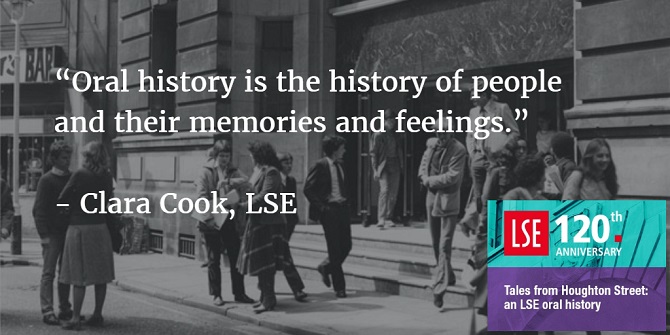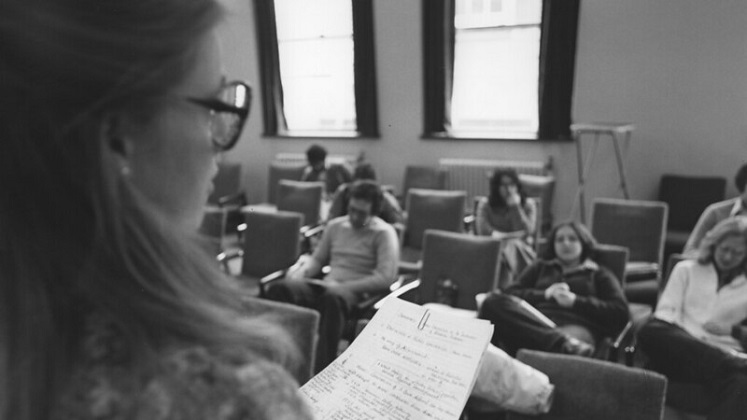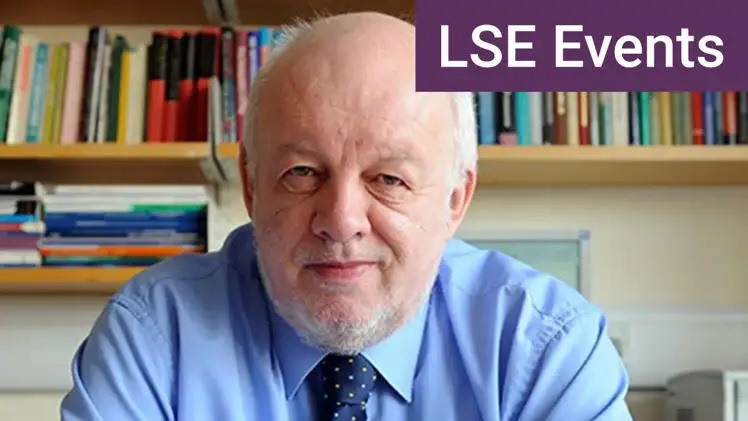In 2022, LSE Library shared details of a project to archive the experiences of the LSE community during the COVID-19 pandemic. In this second post, Library curator Daniel Payne speaks to members of the project team as they reflect on the process of conducting these oral histories, where the LSE community were invited to speak about the impact of the pandemic on their lives.
Official documents that relate to significant events in history are an invaluable resource to the future historian, but what they often exclude are the feelings and experiences of the people that lived through it. Oral histories are one way to address this; by inviting people to speak freely and tell their story in their own words of what life was like for them. The audio and transcript of these interviews are then archived and made available for the future researcher. You can listen to an example of an Oral History project from the Women’s Resource Centre, available on the LSE Digital Library.
In the latter half of 2022, trained archivists and curators at LSE Library worked in partnership with volunteer PhD students from LSE’s Department of International History to conduct these oral histories with members of the LSE community. It was an enormous privilege to listen to LSE colleagues open up and speak about what has been for many an extremely painful period in the history of their time at the School.
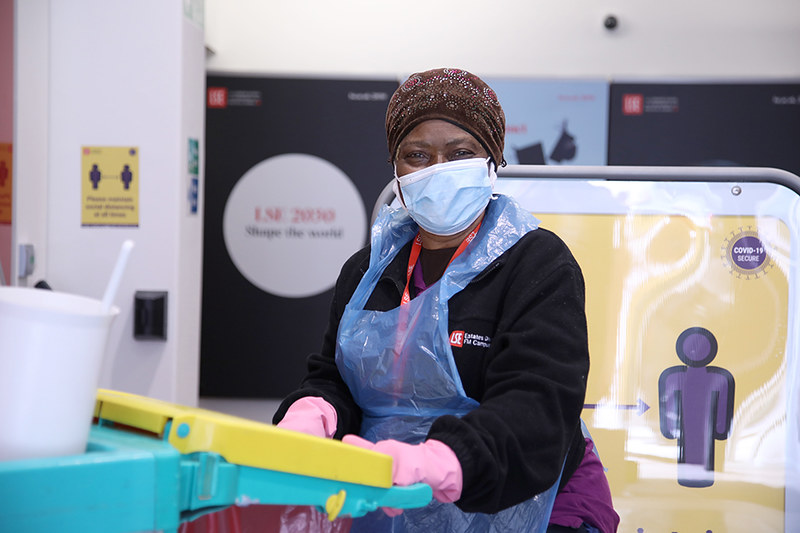
Emma Pizarro, an archivist at LSE Library who was on the project, spoke about her experiences:
“Although we look after a lot of oral history collections in the archives at the Library, it was a completely new experience for us to lead a project to create one ourselves and there was a great deal to think about in the initial planning stages.
We had to prepare a lot of documentation in order to submit the project for review by the LSE Research Ethics team, which included drafting a detailed data management plan, consent form, recording agreement, and a participant information sheet for potential interviewees – this document provided not only an overview of the project and what we were aiming to achieve with it, but also explained how the interview would be conducted, how we would manage personal data and confidentiality and what options participants would have in terms of copyright and future re-use and access to their interview. We recognised the degree of trust that participants would be placing in us so we wanted to make sure they were completely comfortable before agreeing to be involved and to assure them that we would look after their contributions in accordance with their wishes.
Drafting all of this felt quite overwhelming at the time but working out the details this thoroughly at the start really paid off later in the project as we had already thought about scenarios and questions that might otherwise have taken us by surprise.
We’ve all learnt a lot from working on this project and we’ve already been able to share our knowledge and experience with others – we’re in touch with a couple of external oral history projects that will eventually be depositing their interviews with us and we’ve shared our forms and run practical sessions for them to help them get started. It makes our eventual task of processing, cataloguing and preserving their interviews easier if we’ve been able to advise on their projects from the outset.”
– Emma Pizarro, Archivist at LSE Library
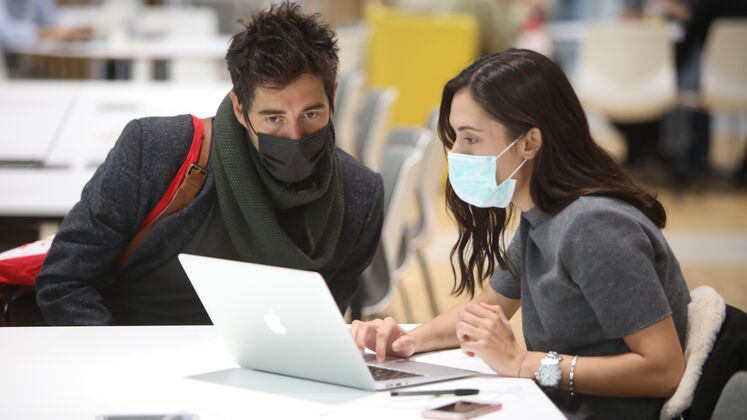
Celine Mitchell is a third-year PhD student in the Department of International History at LSE, where she is writing a contemporary history of the French Algerian youth, through the lens of hip-hop. We asked Celine what made her decide to volunteer to be one of the oral history interviewers.
“As oral history is a crucial aspect of my doctoral primary research, I was really excited to have the opportunity to receive great-quality training and further practical experience in oral history. On a more personal level, I have been studying at LSE since 2016 – first for my master’s degree, and now for my doctorate degree. So, volunteering for the project meant being able to really feel like part of the School community again – especially after long periods away from the university during the pandemic. And of course, given the important nature of the project in documenting the wide-ranging experiences of our community during this time, this was certainly not an opportunity I wanted to turn down!”
– Celine Mitchell, PhD Student
Jonathan Franco is a doctoral student at the Department of International History at LSE. His research focuses on United Nations peacekeeping and peacemaking in the Arab-Israeli conflict.
“I volunteered for the project for three main reasons. First was my historian’s fascination; it was clear from a very early stage that COVID-19 was creating an unprecedented global crisis, one un-comparable to anything that had happened in my lifetime at least. I was curious to understand its social, economic, and personal ramifications on the people around me.
Second, and in close relation with the first reason, I felt that this was my opportunity to offer my humble contribution to the global understanding of COVID, mostly on the emotional level. I am neither a physician nor a psychologist, and yet my historiographical expertise came in handy as I sat down to interview people about their day-to-day-life during the epidemic. It was beautiful to learn that, just as I wanted to record and understand this human drama, others were excited to share their story and to better comprehend themselves what they had gone through.
The third reason is a little more technical and prosaic, but also important for my personal research: I was hoping that the project would better equip me to conduct history-oriented interviews, and I am glad to say that it absolutely did.”
– Jonathan Franco, PhD Student
Conducting the interviews was an often very moving experience both for the interviewees and interviewers alike. We asked Celine how conducting the interviews felt for her:
“I wasn’t quite sure what to expect at first… I’m not someone who is very good with technology, so just remembering how to get the recorder to work was the first major challenge! Overall though, the experience of doing the interviews was really interesting, particularly in being able to engage with people across the school community who had such different lived experiences of the pandemic. At times, it was difficult to hear about how negatively some people had been affected, and the impact this still has on them today. On the other hand, it was also very moving to hear stories of huge resilience and strength arise in these interviews – ones that definitely made me feel proud to be part of the LSE community. Volunteering for this project, and being supported by such a great team, has allowed me to develop my self-confidence in conducting oral history interviews, and I will look forward to applying all the experience I have gained to my own doctoral research.”
– Celine Mitchell
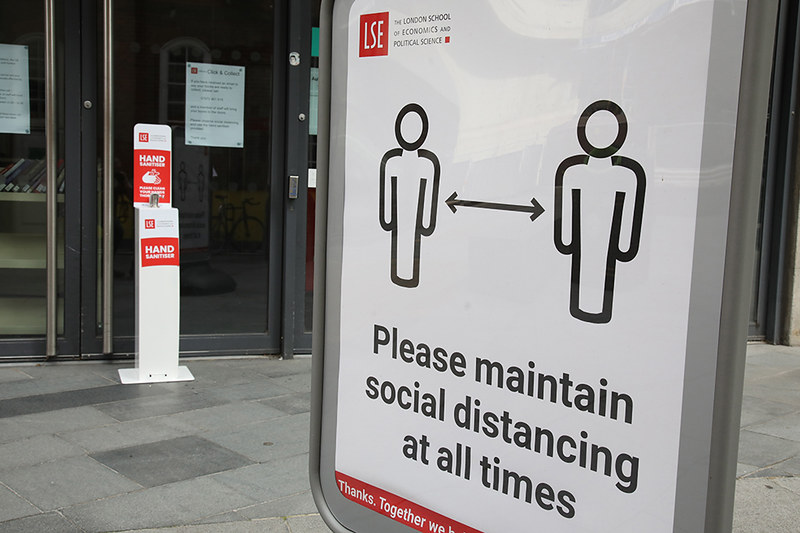
As the project was time-limited, we sough to interview 25 people who came from diverse backgrounds across the LSE community, including academic and professional staff as well as students at different stages in their studies. We asked Reverend Professor James Walters, who kindly offered to be interviewed, what the process felt like for him:
“I agreed to be interviewed for the COVID Oral History project because it is clear that the pandemic has been a major event in history, touching every individual and every institution. So it felt really important for LSE to record for future generations how this unprecedented closure of our campus and the suffering and disruption the virus brought about has affected our community. Like many people at LSE, I was caught up in the major structural challenges of running a university entirely remotely, but I was also very conscious of the personal impact on so many, particularly through the online bereavement groups I convened for both staff and students.
Personally, I found it quite therapeutic to go back over the experiences with the interviewer, recalling some of the difficult emotions I had been carrying for myself and for others, as well as the positive moments, such as having more time to reflect and, in my case, to spend time in prayer.”
– Reverend Professor James Walters
The COVID Oral History Collection will be made available for researchers to listen to on the LSE Library’s Digital Library. All interviews will be made available in accordance with the wishes of the participants and are subject to at least a five year embargo period. The earliest available interviews will be released in 2027. If you have any questions about the project or would like to find out more, please get in touch with LSE Library at library.enquiries@lse.ac.uk.


